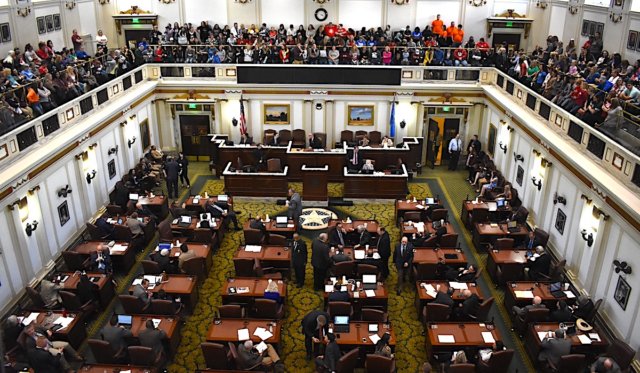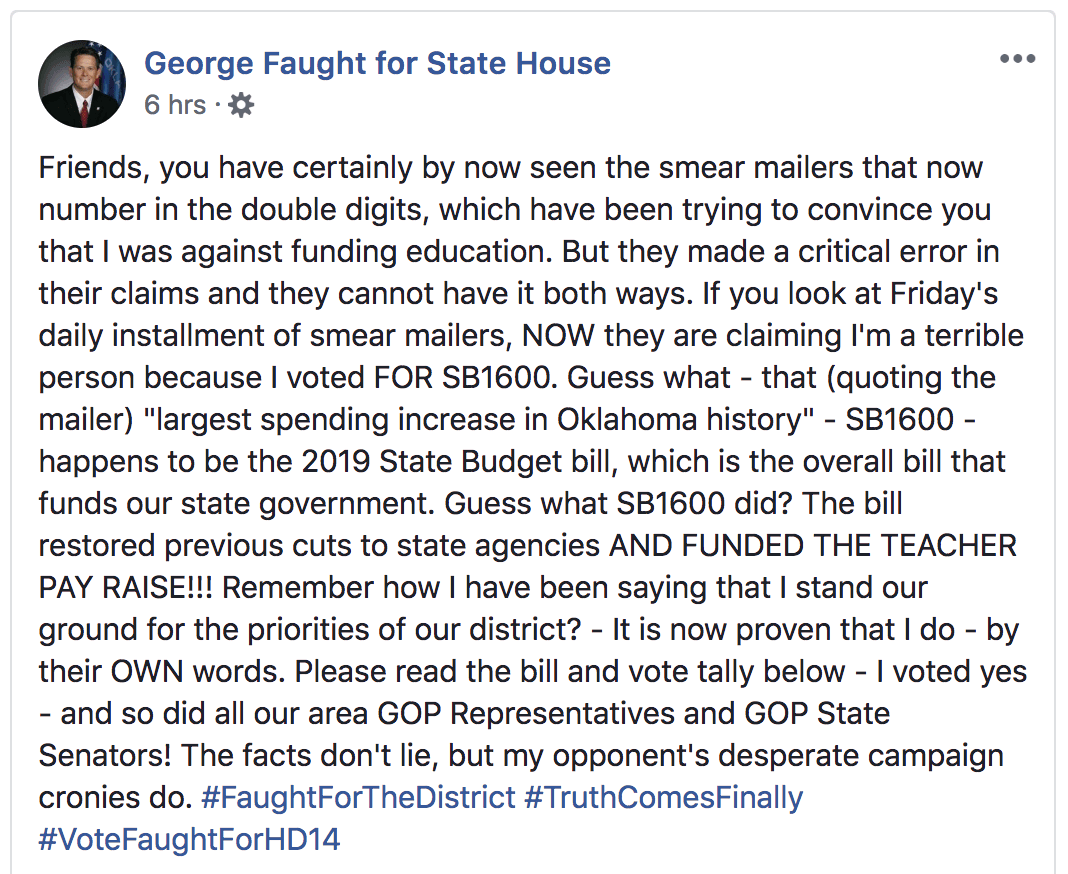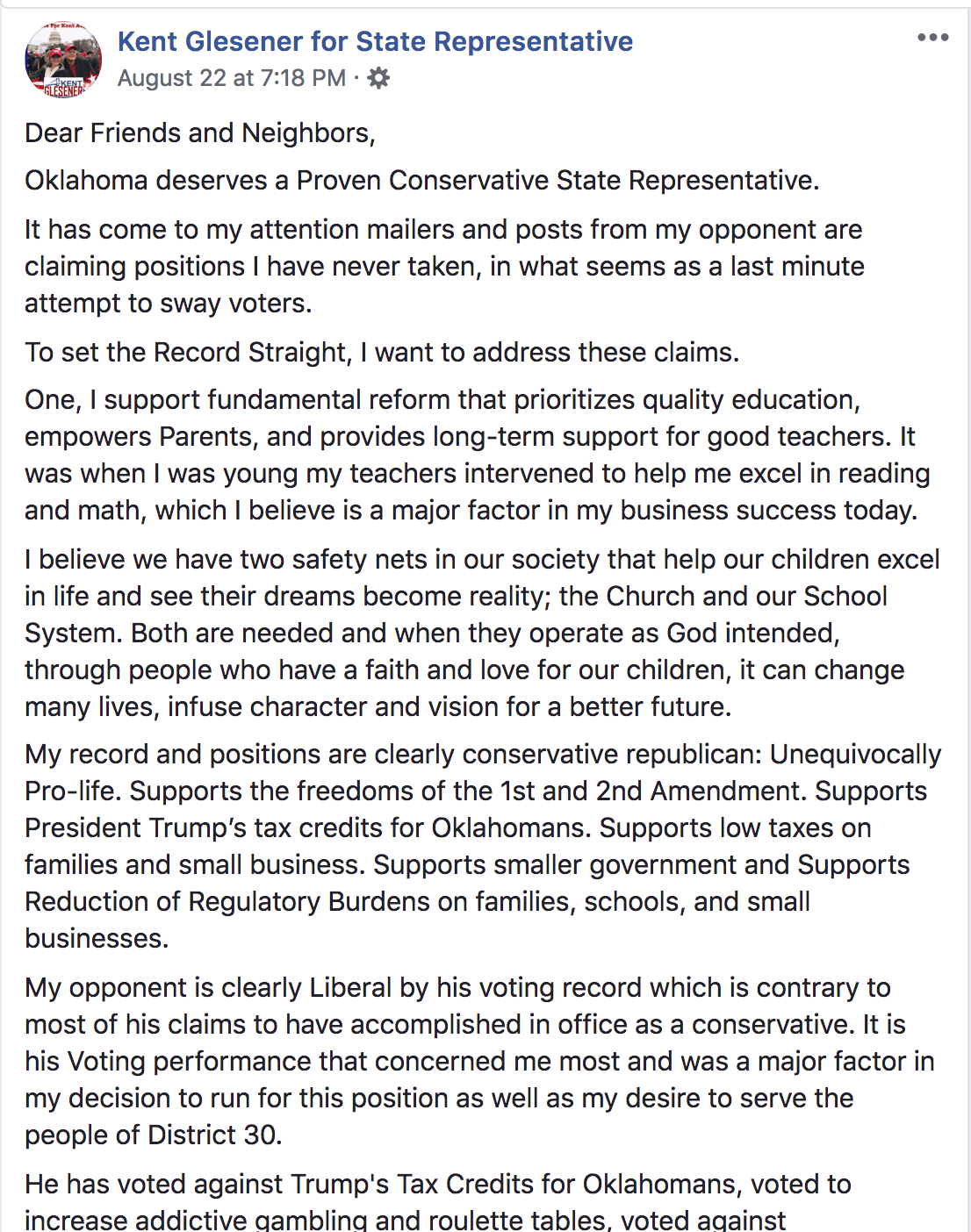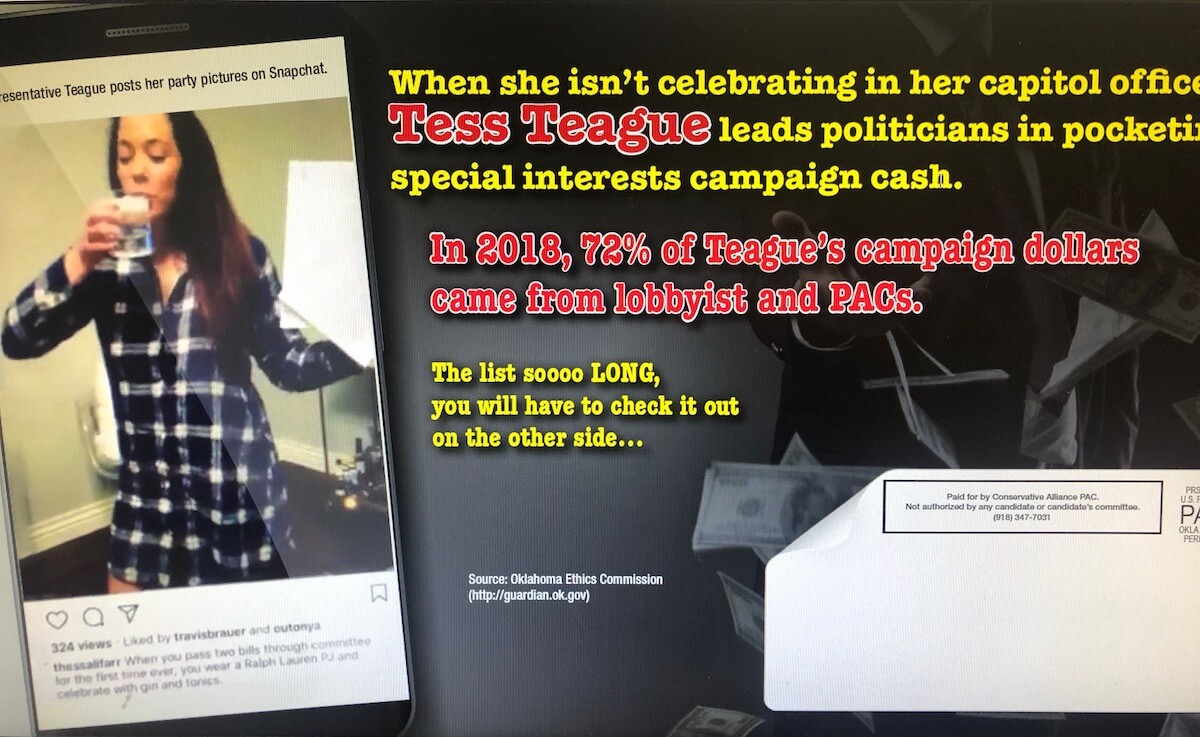

Republicans may currently dominate the Oklahoma Legislature, but a “Civil War” has broken out during the party’s 2018 primary season.
“Civil War” was the phrase a self-described “pragmatic” Rep. Josh West (R-Grove) used after a March confrontation with hardline conservative Rep. Mike Ritze (R-Broken Arrow). The latter had attended a press conference criticizing the former and other GOP House members who have voted to raise taxes to fund a large investment in public education — HB 1010XX.
Since, seven anti-tax firebrand House members have been drawn into Aug. 28 runoffs, and two others — Rep. Chuck Strohm (R-Jenks) and Rep. Scott McEachin (R-Tulsa) lost outright on June 26.
At the same time, two revenue-supporting GOP incumbents are also in runoffs against hardline Republicans who preach a God, Guns and Audits-Not-Taxes gospel. (Three yes-on-revenue House Republicans also lost June 26, but none of the candidates who defeated them campaigned on far-right, anti-tax rhetoric. Additionally, one yes-on-revenue incumbent is being challenged in the HD 66 runoff by an education-focused Republican as well.)
Voter information
As the GOP “Civil War” has drawn on, ideological lines have become more clear in runoff races, as well as in open seats. Moderate Republican lawmakers have shuttled campaign cash to both incumbent colleagues and open-seat candidates who are facing opponents farther to the right. At the same time, a website has disparaged moderate Republicans and House GOP leaders, claiming they have “bought” their positions and used “bribes” to run the House.
Below, NonDoc has compiled synopses of House incumbent-involved races where the GOP “Civil War” rages ahead of Tuesday’s runoff election. (Additionally, we have provided brief primers on all other #okleg runoffs.)
HD 10: Rep. Travis Dunlap and Judd Strom
Rep. Travis Dunlap (R-Bartlesville) voted against HB 1010XX’s revenue for teacher and public employee raises, and challenger Judd Strom pushed Dunlap into a runoff partially by rounding up education advocates who wanted a teacher pay plan passed.
One of those advocates is Rep. Earl Sears (R-Bartlesville), a term-limited former appropriations chairman with deep ties to Bartlesville Public Schools. Put another way, one current Bartlesville Republican lawmaker who voted for HB 1010XX is opposing the re-election of another who opposed it.
Strom has placed 21 targeted Facebook ads for his campaign since the June 26 primary, while Dunlap has appeared in no Facebook ads other than ones paid for by third-party groups such as OK United.
HD 14: Rep. George Faught and Chris Sneed
Growing up, Rep. George Faught (R-Muskogee) once had former Superintendent of Public Instruction Sandy Garrett as a teacher. But as he seeks his final possible term in the Legislature, Faught’s votes against revenue for education have drawn him criticism from GOP runoff opponent Chris Sneed, the Tulsa World and others.
In the primary, Faught received 44.5 percent of the popular vote compared to Sneed’s 28.4 percent, but Faught’s Facebook posts indicate his anti-tax votes have been criticized by a dark-money group called the Conservative Alliance PAC, which has attacked similar far-right House GOP incumbents and also played in open seats.
Faught has pushed back, arguing that by voting for the latest state budget he did support revenue for state teacher raises:

Faught’s post above highlights the duplicitous nature of the Conservative Alliance PAC’s criticisms — blasting incumbent lawmakers for voting against new revenue while also attempting to say they support big government spending.
Similarly, however, Faught has offered his own contradictory rhetoric to Muskogee-area voters, claiming in a Muskogee Phoenix interview that “properly funding core services of government” is his top priority and that he supported “both the pay raise and the largest education budget” in the 2018 session.
While Faught voted for bills raising the minimum teacher salary and advancing the budget, he spent his last two years in office voting against all three major revenue packages to stabilize the state budget and hike education funding: Plan A+, Step Up Oklahoma and HB 1010XX.
Those votes formed the foundation for a scathing Tulsa World editorial that endorsed Sneed over Faught:
Sneed is challenging George Faught, who has used the seat to be a largely unsuccessful and ignored social crusader. He voted against critical public education funding measures — House Bill 1010xx and its predecessor Step Up Oklahoma.
The editorial also chided Faught for suggesting that “rape” is the will of God:
When asked if “rape was the will of God,” he responded: “If you read the Bible, there were a couple of circumstances where that happened. God uses all circumstances. … If it happens in someone’s life, it might not be the best thing that ever happens. But if you’re saying God is not sovereign, that he is unable to use everything in someone’s life, I can’t agree.”
Faught has raised about $85,000 (with about $46,000 of that transferred from his previous re-election efforts), while Sneed has raised about $28,500 with more than $22,000 of that coming from a personal loan.
HD 20: Rep. Bobby Cleveland and Sherrie Conley
For interviews with both candidates in this GOP runoff election, read this article.
HD 30: Rep. Mark Lawson and Kent Glesener
Rep. Mark Lawson (R-Sapulpa) was first elected in 2016. Like the rest of the Legislature’s large freshman class, Lawson ended up making several votes in favor of tax packages to pay for teacher pay increases, a core issue that voters discussed in 2016.
While Lawson (47.5 percent) nearly won the HD 30 GOP primary outright in June, he faces staunch conservative Kent Glesener (22.5 percent), an engineer. Glesener has been endorsed by former GOP Rep. Pam Peterson, former GOP Sen. Dan Newberry and former HD 30 Rep. Mark McCullough.
Glesener has criticized Lawson for voting for HB 1010XX’s set of tax increases:

But Lawson has fired back with a mailer saying Glesener has received more in state contracts than all teachers in Sapulpa Public Schools make combined:
 Loading...
Loading...
Glesener has raised about $53,600 for his campaign, including a $30,000 personal loan. His only PAC contribution has been $500 from Dolese Bros., a concrete company. Lawson has raised more than $107,000, with contributions coming from police, firefighters, education advocates and House leadership PACs.
HD 36: Rep. Sean Roberts and Louise Redcorn
Roberts, who received 33 percent of the primary vote, has been the target of third-party advertisements criticizing his votes against revenue bills to fund teacher pay. During April’s teacher walkout, a Tulsa high school English teacher criticized Roberts in a Facebook post that has been shared 4,600 times.
Redcorn, who received 32.1 percent in the primary, has been critiqued as too liberal for her district, but her March 25 explanation for deciding to run — prior to the April teacher walkout — stands as one of this election cycle’s most vivid signs of upheaval in rural Oklahoma:
Redcorn’s pre-runoff financial report shows about $34,400 in contributions, including money from the Cherokee Nation, the Choctaw Nation, George Kaiser, the Tulsa Regional Chamber, the Greater Oklahoma City Chamber and Tulsa Frontier publisher Bobby Lorton. Roberts’ report shows he has raised just shy of $19,000, with his largest contributions coming from an agriculture PAC, oil and gas PACs and Oklahomans for Vaccine Choice.
HD 38: Rep. John Pfeiffer and Brian Hobbs
House District 38 runs from the northern part of Guthrie all the way to the Kansas border, and this year it features the closest runoff for a revenue-voting member of the House GOP majority: Rep. John Pfeiffer (R-Orlando). A cattleman, Pfeiffer received 42.5 percent of the primary vote to challenger Brian Hobbs‘ 31.3 percent. Both men are military veterans.
Despite voting for all of 2018’s major teacher pay raise plans and revenue bills, Pfeiffer lost some educator support in the primary to Tonkawa Public Schools board member Casey McAninch, who finished third. Hobbs, meanwhile, has criticized Pfeiffer from the right, calling him liberal and touting his own endorsements from Muslim-trashing Rep. John Bennett (R-Sallisaw) and former U.S. Sen. Tom Coburn.
In announcing Coburn’s support, Hobbs posted a brief note from Coburn with a U.S. Senate logo awkwardly superimposed at the top:
Pfeiffer has a financial advantage over Hobbs, according to their pre-runoff ethics reports. Pfeiffer has raised more than $80,000, while almost all of Hobbs’ campaign money has come from a $30,000 personal loan.
HD 63: Rep. Jeff Coody and Trey Caldwell
Rep. Jeff Coody (R-Grandfield) is an insurance agent who was first elected to the Legislature in 2014, becoming the first son to serve alongside his mother, Anne Coody, in Oklahoma House history.
Since, the younger Coody has made a name for himself by pushing controversial legislation to repeal permitting requirements for carrying firearms in public. He also helped lead this year’s charge to repeal existing ad valorem tax exemptions for wind farms.
But Jeff Coody has also frustrated education advocates for voting against revenue to fund teacher raises and telling Cache High School students that demands for those raises were “akin to extortion.” (His mother was an educator, and his wife was also named Grandfield High School teacher of the year in May.)
Three people challenged Coody in the GOP primary, but no one topped 40 percent of the vote in the race. While being endorsed by the Oklahoma Second Amendment Association, Coody led challenger Trey Caldwell by 20 votes in the primary.
Caldwell has been endorsed by The Oklahoma Chronicle, a southwest Oklahoma newspaper, and works as an insurance agent and farmer. Friday on Facebook, he posted that “Coody has lied to voters repeatedly” and referenced some sort of criticism Coody has made concerning old tweets Caldwell issued in college:
Coody has raised about $39,000, while Caldwell has raised more than $54,000, including a $10,000 personal loan and donations of $5,000 or more from the Choctaw Nation, the Greater Oklahoma City Chamber of Commerce and Nextera Energy.
HD 66: Rep. Jadine Nollan and Brian Jackson
Rep. Jadine Nollan (R-District 66) is an eight-year incumbent and serves as chairwoman of the Higher Education and Career Tech Committee. Nollan voted for all three major education-funding tax packages during the 56th Legislature, but she was pushed into a runoff against a pro-education candidate, Brian Jackson.
Jackson is an Oklahomans for Public Education-endorsed candidate and works as a Development Manager at Junior Achievement of Eastern Oklahoma, per a Sandite Pride News article.
Nollan received 45.6 percent of the primary vote compared to Jackson’s 36.6 percent.
HD 80: Stan May and Rep. Mike Ritze
As mentioned above, Rep. Mike Ritze (R-Broken Arrow) has been a hardline conservative in the Oklahoma House of Representatives since he was first elected in 2008. Ritze has clashed with both Democrats and Republicans, angering some for often appearing to check in at the Capitol on Thursdays before returning to his district and often missing votes.
During the 2018 session, Ritze got into a heated confrontation with Rep. Josh West (R-Grove) over the freshman lawmaker’s vote in favor of HB 1010XX’s tax increases. During the argument, Ritze reportedly asked West if his “PTSD” was affecting his behavior, a statement West said was inappropriate.
With West announcing on social media that Ritze had started a “Civil War” among House Republicans, word spread that Ritze had been misrepresenting his military service for years.
Eventually, Ritze was asked by the Disabled American Veterans to “remove any reference to being a member” after the organization examined whether he qualified for membership and determined his “honorary” membership card had been created outside of the DAV’s rules.
In the June 26 primary, Ritze received 36.6 percent of the vote while retired firefighter Stan May received 39.5 percent. Third GOP candidate Cody Coonce (24 percent) has since endorsed May, who posted on Facebook Wednesday that he attended a candidate forum at a Broken Arrow middle school, which Ritze did not attend.
Ritze, meanwhile, has only posted on his campaign Facebook page three times since the June primary: twice about his family and once to push back on “lies” from the Conservative Alliance PAC, which he calls a “liberal Democrat group.”
In the post, Ritze says he was awarded “an honorary lifetime membership to DAV” in 1968, but he does not mention the DAV’s letter noting he had been removed from DAV rolls and that “honorary” memberships are not permitted by the organization’s constitution.
HD 101: Rep. Tess Teague and Robert Manger
For interviews with both candidates in this GOP runoff election, read this article. Since that piece was published, Teague has been the target of third-party attack advertisements by the Conservative Alliance PAC, including this grammatically challenged mailer that confuses Snapchat with Instagram:

GOP runoffs in open seats
The following GOP runoffs are in open House seats, and links to existing primers on these races are provided where available.
HD 17: Jim Grego and John Hass
Jim Grego, a farmer and former postmaster, received 28.9 percent of the popular vote in the primary. His opponent Josh Hass, an insurance agent and small business owner, received 34.9 percent.
The winner will face Democrat Peggy DeFrange in the general.
HD 27: Danny J. Sterling and Dave Spaulding
Danny Sterling is an educator and received 37.8 percent of the vote in June. His opponent Dave Spaulding received 37.4 percent and is the owner and operator of a sandblasting company.
The Democrat running for HD 27 dropped out on April 16. The winner of Tuesday’s runoff-primary wins the seat.
HD 41: Roxanne Pollard and Denise Crosswhite Hader
For more complete coverage on HD 41, read this article.
HD 43: Jay W. Steagall and Crystal Duncan
For more complete coverage on HD 43, read this article.
HD 47: Brian Hill and Beverly Adams
HD 47 is an open district owing to Rep. Leslie Osborn’s (R-District 47) bid for commissioner of labor.
For more complete coverage on HD 47, read this article.
HD 61: Kenton Patzkowsky and Brad Raven
Kenton Patzkowsky received 42 percent of the primary election vote and is a farmer and rancher from Beaver County. Brad Raven serves as county commissioner for district one in Beaver county. He recieved 31.7 percent of the primary vote.
HD 68: Lonnie Sims and Nicole Nixon
Lonnie Sims is a city councilor for Jenks ward 2 and received 33.4 percent of the popular vote. Nicole Nixon is a businesswoman who received 27.9 percent of the vote.
HD 71: Cheryl Baber and Beverly A. Atteberry
Cheryl Baber received 43.1 percent of the primary election vote, with Beverly A. Atteberry taking 24.2. The winner will face democrat Denise Brewer.
HD 79: Dan Hicks and Karen Gilbert
The HD 79 primary was close, with Dan Hicks receiving 44.9 percent of the vote compared to Karen Gilbert’s 48.3. The winner will face Democrat Melissa Provenzano in November.
HD 82: Nicole Miller and Brad Martin
Nicole Miller received 33.8 percent in the primary election compared to Brad Martin’s 17.4. For more complete coverage of HD 82, read this article.
HD 98: Laura Steele and Dean F. Davis
Laura Steele is a teacher at Jenks Middle School and received 29.3 percent of the primary vote. Dean F. Davis is a teacher and in Broken Arrow and received 27.3 percent of the primary vote.
HD 100: Julie Roach and Marilyn M. Stark
Julie Roach recieved 41.5 percent of the primary vote compared to Marilyn M. Stark’s 38.1. For more coverage on HD 100, read this article.
GOP runoffs in open Senate seats
The following GOP runoffs are in open Senate seats, and links to existing primers on these races are provided where available.
SD 10: Bill Coleman and Amber Roberts
SD 10’s Eddie Fields (R-Wynona) vacated his seat to run for lieutenant governor, receiving 13.7 percent of the vote in the Republican primary.
Bill Coleman almost won SD 10 outright in the primary, receiving 48.4 percent compared to Amber Roberts’ 27.4. Coleman owns and operates a family of five radio stations.
The wife of HD 36 Rep. Sean Roberts, Amber Roberts has no readily available online resources. With no other candidates in the race, the winner of Tuesday’s runoff-primary wins the election.
SD 30: Lori Callahan and John Symcox
For interviews with both candidates in this GOP runoff election, read this article.
SD 36: John Haste and Bill Day
John Haste holds the edge over Bill Day with 34.6 percent of the primary vote compared to Bill Day’s 25.6.
For more complete coverage on SD 36, read this article.
Democratic #okleg runoffs
SD 16: Mary B. Boren and Rep. Claudia Griffith
Mary Boren’s Democratic runoff opponent, Rep. Claudia Griffith (D-Norman), died in July. While Griffith’s name will appear on the Aug. 28 ballot, Boren is likely to advance and face Republican Becki Maldonado in November.
HD 26: E. Bruce Bushong and Terry W. Hopkins
Terry W. Hopkins led the primary with 38.7 percent of the vote. E. Bruce Bushong, an educator, received 31.78 percent. The winner will face incumbent Rep. Dell Kerbs (R-District 26) in November.
HD 41: Jennie Scott and Sara Peterson
Jennie Scott received 37.7 percent of the primary vote while Sara Peterson recieved 39 percent. For more coverage on HD 41 read this article.
HD 53: Cyndy Southerland and Leslie Bonebreak
Leslie Bonebreak has worked as a treasurer and served in various positions in her county Democratic party, receiving 39.3 percent of the primary vote. Cyndy Southerland is an educator and received 36.1 percent of the primary vote.
The winner will face incumbent Rep. Mark McBride (R-District 53) in November.
HD 68: Angela Statum and Michael Ross
Angela Statum almost won the primary outright with 49.3 percent of the popular vote. Her opponent Michael Ross received 32.9 percent.
For more coverage on HD 68, read this article.
HD 99: Ajay Pittman and Nkem House
Ajay Pittman received 38.1 percent of the popular vote compared to Nkem House’s 32.1. For interviews with both candidates, read this article.
HD 101: John Carpenter and Madeline Scott
John Carpenter was a sentencing guideline specialist for the Oklahoma Department of Corrections until 2011. He received 28.8 percent of the popular vote. Madeline Scott, a teacher, received 32.5 percent of the vote.
The winner will face the winner of the Republican HD 101 runoff-primary.
(Update: This post was updated at 1:12 a.m. Sunday, Aug. 26, to clarify attribution of OKHD.org.)




















